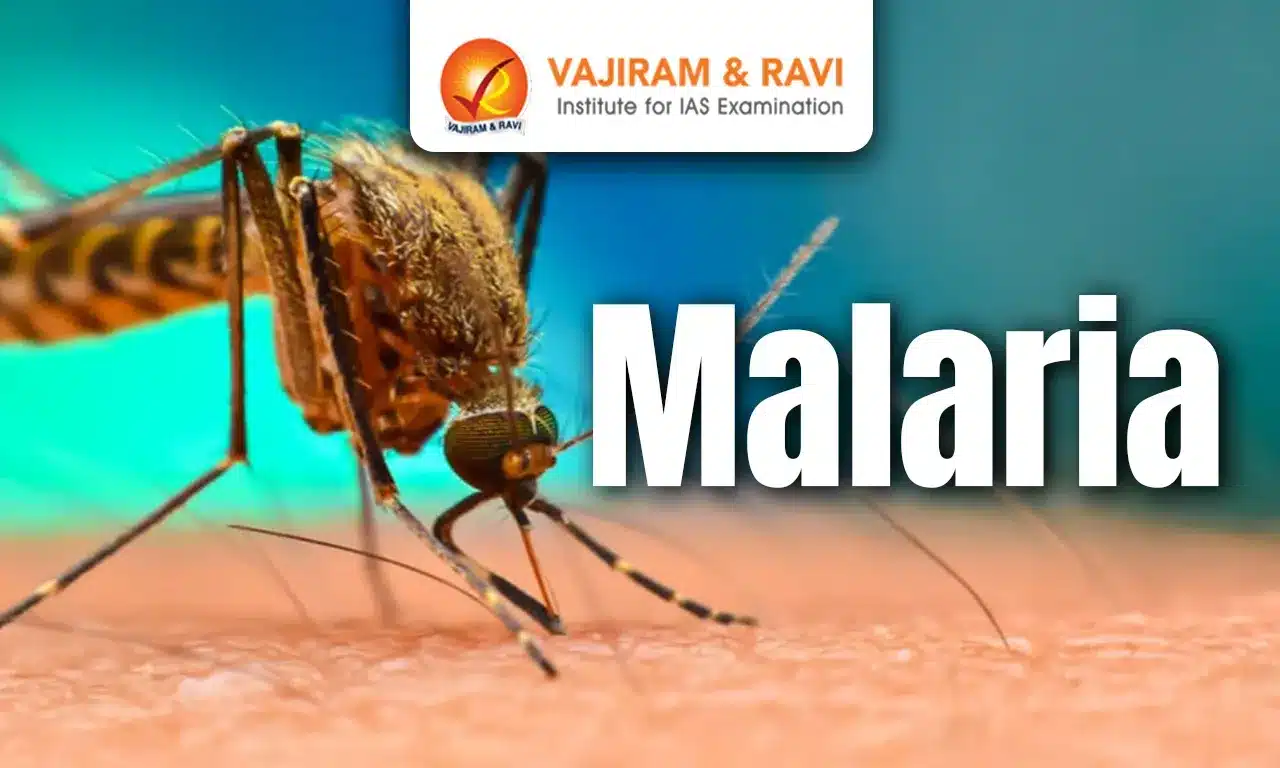Malaria Latest News
World Malaria Day is observed every year on April 25, as endorsed by WHO member states in 2007.
- The theme for 2025 is “Malaria Ends With Us: Reinvest, Reimagine, Reignite”, which urges renewed global action against malaria through innovation, collaboration, and sustained commitment.
About Malaria
- Malaria is a life-threatening febrile illness caused by Plasmodium parasites, transmitted through the bites of infected female Anopheles mosquitoes.
- The disease is not contagious, but can be spread through infected blood or contaminated needles.
- The most dangerous species are Plasmodium falciparum and Plasmodium vivax.
Symptoms and Risks
- Symptoms appear 10–15 days after infection and include fever, chills, and headache.
- Severe symptoms can include seizures, difficulty breathing, jaundice, dark urine, and death if untreated.
- Partial immunity can develop in endemic regions, making diagnosis difficult in some patients.
Prevention and Treatment
- Prevention includes vector control, use of mosquito nets, repellents (DEET, IR3535, Icaridin), long clothing, and chemoprophylaxis for travellers.
- Early diagnosis and treatment using microscopy or rapid diagnostic tests (RDTs) are critical.
- Treatments include:
- ACTs (Artemisinin-based Combination Therapies) for P. falciparum.
- Chloroquine for P. vivax where effective.
- Primaquine to prevent relapses in P. vivax and P. ovale infections.
- Severe malaria cases require injectable treatments in clinical settings.
Malaria FAQs
Q1. What causes malaria?
Ans. Malaria is caused by Plasmodium parasites, transmitted through the bite of infected female Anopheles mosquitoes.
Q2. Which Plasmodium species is the deadliest?
Ans. Plasmodium falciparum is the most severe and deadly species causing malaria.
Source: PIB
Last updated on February, 2026
→ Check out the latest UPSC Syllabus 2026 here.
→ Join Vajiram & Ravi’s Interview Guidance Programme for expert help to crack your final UPSC stage.
→ UPSC Notification 2026 is now out on the official website at upsconline.nic.in.
→ UPSC IFoS Notification 2026 is now out on the official website at upsconline.nic.in.
→ UPSC Mains Result 2025 is Out on the official website at upsc.gov.in.
→ UPSC Calendar 2026 has been released.
→ UPSC Prelims 2026 will be conducted on 24th May, 2026 & UPSC Mains 2026 will be conducted on 21st August 2026.
→ The UPSC Selection Process is of 3 stages-Prelims, Mains and Interview.
→ Prepare effectively with Vajiram & Ravi’s UPSC Prelims Test Series 2026 featuring full-length mock tests, detailed solutions, and performance analysis.
→ Enroll in Vajiram & Ravi’s UPSC Mains Test Series 2026 for structured answer writing practice, expert evaluation, and exam-oriented feedback.
→ Join Vajiram & Ravi’s Best UPSC Mentorship Program for personalized guidance, strategy planning, and one-to-one support from experienced mentors.
→ UPSC Result 2024 is released with latest UPSC Marksheet 2024. Check Now!
→ UPSC Toppers List 2024 is released now. Shakti Dubey is UPSC AIR 1 2024 Topper.
→ Also check Best UPSC Coaching in India
Tags: malaria prelims pointers upsc current affairs upsc prelims current affairs

















